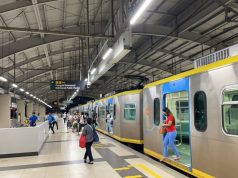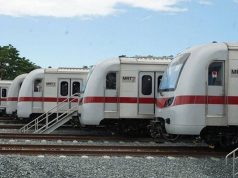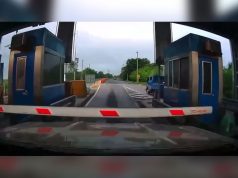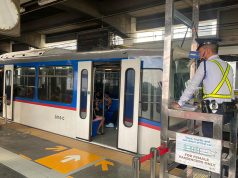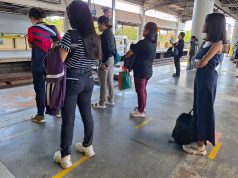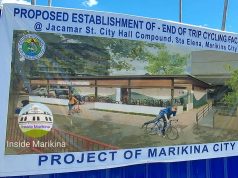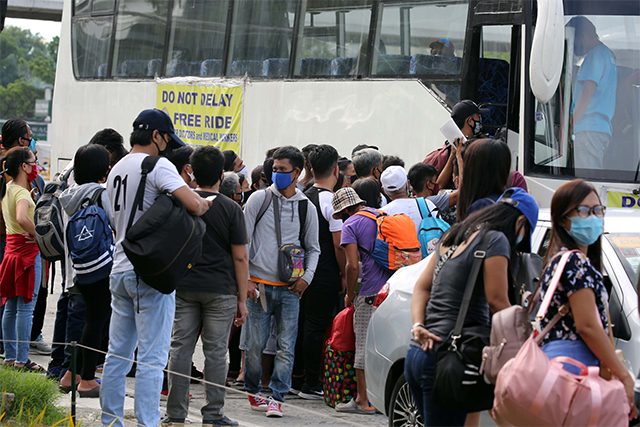
Physical distancing was not enforced in some vehicles provided by authorities as Filipinos go back to their workplaces on the first day of the metro-wide general community quarantine despite limited transportation options.
Pictures and videos of commuters were shared by news outlets and field reporters which showed the lack of enforcement of health protocols established by the government in terms of traveling.
Mark Demayo of ABS-CBN News shared pictures of some commuters along Commonwealth Avenue in Quezon City who were forced to board police patrol cars and a military truck due to the lack of transportation options.
A closer look at the pictures showed that the commuters sat and stood right next to each other.
Dahil walang masakyan, napuwersang sumakay sa mga truck at police patrol car ang ilang commuter ngayong Lunes ng umaga sa Commonwealth Avenue, unang araw ng GCQ sa Metro Manila. Mark Demayo, ABS-CBN News #COVID19quarantine #CommuterPatrol pic.twitter.com/Sq3nV1vTVa
— DZMM TeleRadyo (@DZMMTeleRadyo) June 1, 2020
A video from DZBB correspondent Allan Gatus showed commuters in the same area who boarded the Philippine National Police‘s patrol car.
It was shared by GMA Network broadcast journalist Kara David, who noted that the commuters previously attempted to flag down private vehicles in a desperate attempt to have a ride to their workplaces.
1st day of GCQ: a lot of stranded passengers along Commonwealth Avenue. Commuters trying to flag down private vehicles to be able to get to work. PNP truck passes by and commuters scramble to get a seat. Video from Allan Gatus of DZBB pic.twitter.com/6aOeEV81Ka
— Kara David (@karadavid) June 1, 2020
Guidelines on physical distancing indicate that Filipinos must stay away from each other for at least a meter apart, which is nearly equivalent to a motorcycle’s length, in a bid to mitigate the spread of the novel coronavirus.
It is applicable in public settings and any place outside of residence.
Meanwhile, the pictures and videos from the ground earned criticisms from some Filipinos who noted that the authorities failed to practice physical distancing measures on their provided transportation.
“I do not understand government protocols. You ban jeepneys and tricycles and instead replicate their services using government resources WITHOUT ENFORCING your proud social distancing policy?” a Twitter user said.
“See, by limiting transportation options in the name of safety, the government forced people to seek other, most likely unsafe means. If the health problem becomes worse, government has no one to blame but itself,” another online user wrote.
A Filipino likewise questioned the current ban on public utility buses, jeepneys and having passengers in motorcycles if the physical distancing measures are not being enforced by some authorities themselves.
YASSSS BAWAL ANG BUS JEEP AT ANGKAS KASI WALANG DISTANCING, SO GANITO NA LANG HAHAHAHAHAHA PUKINGAMA NAMAN TALAGA NG MGA BOBONG INUTIL https://t.co/d19aQCLSZ4
— bwisette vergeire (@mcmorco) June 1, 2020
The Department of Transportation (DOTr) previously said that it has adopted two phases upon the resumption of public transport operations in a supposed bid to reduce crowds or the sudden surge of people in terms of commuting.
Phase 1, scheduled from June 1 to 21, allows trains, point-to-point buses, taxis, TNVS or transport network vehicle services like Grab, shuttle services and bicycles to operate in limited passenger capacity.
More affordable alternatives for transportation would not be allowed to operate until Phase 2, which is slated from June 22 to 30. These include public utility buses, modern public utility vehicles or jeepneys and UV express.
Transportation Secretary Arthur Tugade said that the government did not promise to provide rides for all of the workers despite its constitutional mandate to serve the public.
“Nakikiusap kami at nagsusumamo sa inyo na bigyan niyo kami ng pasensiya at understanding…” he said in an interview with CNN Philippines.
“Wala kaming pinangako o sinabi na ang transportasyon ay magiging extensive and will meet the requirements of all on the first day of GCQ — and even in the duration of the GCQ for that matter. Because as I’ve said, our approach is partial, limited, calculated, and gradual,” Tugade added.
A transport economist previously warned that the ban on accessible and affordable public transportation would be an “impending economic crisis.”
“You cannot resume the economy without mobility. If there is no public transport and no dedication for active transport, many will lose their jobs or suffer wage cuts because they would be coming in late for work,” Jedd Ugay, chair of the commuter group AltMobility PH, said.
“In terms of the gross domestic product, a big chunk of productivity will be lost, and of course there will also be the issue of income inequality because many will lose their jobs,” he added.




